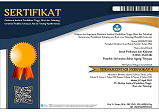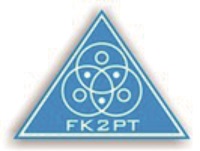Bioaccumulation of Iron (Fe) in Sepat Fish (Trichogaster trichopterus) in Miai River Waters Banjarmasin City
Abstract
Miai River is one of the rivers with various anthropogenic activities such as dense settlements, factories, and landfills. Industrial waste and domestic waste generated by residents are suspected to result in water contamination by toxic materials. Fe pollution is a major concern in aquatic ecosystems, especially in the Miai River of Banjarmasin City. This study aimed to evaluate the concentration of Fe in water and sepat fish and determine its relationship with fish weight. This research was conducted by taking samples of fish and water at 2 different locations and for testing the heavy metal content was analyzed by AAS. The results of Fe levels in river water at point 1 averaged 1.155 mg/L and at point 2 averaged 2.102 mg/L, exceeding the specified quality standards. The results of Fe levels in fish at point 1 averaged 26.450 mg/Kg and at point 2 averaged 22.466 mg/Kg exceeded the standard limit. The relationship between Fe in water and in fish is r = -0.999, meaning that the correlation is very strong and opposite. The relationship between Fe in fish and fish body weight is very low with a value of r = 0.164.
Keywords
Full Text:
PDFReferences
Agbugui MO, Abe GO. 2022. Heavy metals in fish: bioaccumulation and health. British Journal of Earth Sciences Research 10 (1): 47-66. DOI: https://doi.org/10.37745/bjesr.2013/vol10no1pp.47-66
Afrianti S, Irni J. 2020. Analisa tingkat pencemaran logam berat timbal (Pb) di daerah aliran sungai deli Sumatera Utara. Biolink Jurnal Biologi Lingkungan Industri Kesehatan 6 (2): 153-161. DOI: 10.31289/biolink.v6i2.2964
Agustina DY, Suprapto D, Febrianto S. 2019. Kandungan logam berat timbal (Pb) pada ikan nila (Oreochromis niloticus) di sungai tenggang, Semarang, Jawa Tengah. Management of Aquatic Resources Journal (MAQUARES) 8 (3): 242-249. DOI: https://doi.org/10.14710/marj.v8i3.24262
Ainiyah SD, Lestri I, Andini A. 2018. Hubungan antara kadar besi (Fe) air tambak terhadap kadar besi (Fe) pada daging ikan nila (Oreochromis niloticus) dan ikan bandeng (Chanos chanos) di Kecamatan Jabon Sidoarjo. Jurnal Sain Health 2 (2): 21-28.
Aprilliyani EP, Rahayuningsih M. 2020. Keanekaragaman spesies ikan sebagai bioindikator kualitas perairan di sungai kaligarang Kota Semarang. Life Science 9 (1): 1-10. DOI: https://doi.org/10.15294/lifesci.v9i1.47135
Arza A, Martuti NKT. 2023. Bioakumulasi logam besi (Fe) dan seng (Zn) pada ikan bandeng (Chanos chanos) di keramba jaring tancap Kelurahan Tanjung Mas, Semarang. Life Science 12 (2): 107-116. DOI: https://doi.org/10.15294/lifesci.v12i2.73662
Garai P, Banerjee P, Mondal P, Saha NC. 2021. Effect of heavy metals on fishes: toxicity and bioaccumulation. J Clin Toxicol. S 18 (001). DOI: https://doi.org/10.1016/j.chemosphere.2022.134519
Hidayanti K. 2019. Distribusi logam berat pada air dan sedimen serta potensi bioakumulasi pada ikan akibat penambangan emas tanpa izin (Studi kasus: DAS Sekonyer, Kalimantan Tengah). Media Ilmiah Teknik Lingkungan (MITL) 4 (1): 24-33. DOI:https://doi.org/10.33084/mitl.v4i1.651
Ishak NI, Ishak E, Effendy IJ, Fekri L. 2023. Analisis kandungan logam berat pada air sungai Martapura, Provinsi Kalimantan Selatan tahun 2022. Jurnal Sains dan Inovasi Perikanan 7 (1): 35-41. DOI: http://dx.doi.org/10.33772/JSIPi
Łuczyńska J, Pietrzak-Fiećko R, Purkiewicz A, Łuczyński MJ. 2022. Assessment of fish quality based on the content of heavy metals. International Journal of Environmental Research and Public Health 19 (4): 2307-2315. DOI: https://doi.org/10.3390/ijerph19042307
Maizul R, Setyawati SM, Wahyudewantoro G. 2019. Pola pertumbuhan dan faktor kondisi ikan brek (Barbonymus balleroides val. 1842) dari perairan Pulau Jawa koleksi museum zoologi bogoriense (MZB). Al-Hayat: Journal of Biology and Applied Biology 2 (1): 12-15. DOI: https://doi.org/10.21580/ah.v2i1.4643
Naeem S, Ashraf M, Babar ME, Zahoor S, Ali S. 2021. The effects of some heavy metals on some fish species. Environmental Science and Pollution Research 28: 25566-25578. DOI: https://doi.org/10.1007/s11356-021-12385-z
Putri YP, Fitriyanti R, Emilia I. 2019. Analisis kandungan logam berat timbal (pb) di perairan sungsang Kabupaten Banyuasin Provinsi Sumatera Selatan. Indonesian Journal of Industrial Research 2 (2): 1-6.
Sarah R, Tabassum B, Idrees N, Hashem A, Abd_Allah EF. 2019. Bioaccumulation of heavy metals in Channa punctatus (bloch) in river ramganga (UP), India. Saudi Journal of Biological Sciences 26 (5): 979-984. DOI: https://doi.org/10.1016/j.sjbs.2019.02.009
Surbakti NAB, Febriani H, Syukriah S. 2024. Kandungan logam berat besi (Fe) pada air dan daging ikan lemeduk (Barbonymus schwanenfeldii) di sungai belumai deli serdang. Jurnal Akuakultur Sungai dan Danau 9 (1): 21-30. DOI: http://dx.doi.org/10.33087/akuakultur.v9i1.203
Susiani S, Lestari MW. 2022. Hubungan kadar timbal dalam darah dengan kadar hemoglobin pada operator SPBU gombel Semarang. Jurnal Surya Medika 8 (3):138-145. DOI: https://doi.org/10.33084/jsm.v8i3.3606
Supeni EA, Wahab AA, Ariska A. 2020. Struktur ukuran sepat rawa (Trichogaster trichopterus) di perairan rawa bangkau Kalimantan Selatan. Fish Scientiae 10 (1): 3-10. DOI: https://doi.org/10.20527/fishscientiae.v10i1.150
Syukriah S, Fauziansyah H, Amira S. 2024. Studi kandungan logam berat besi (Fe) pada air dan ikan di tambak Medan Belawan Sumatera Utara. Bioma: Berkala Ilmiah Biologi 26 (1): 16-26. DOI: https://doi.org/10.14710/bioma.2024.58929
Vidyastuti NH, Syam N, Abbas HH. 2022. Analisis spasial konsentrasi logam berat timbal (pb) pada ikan di kanal Kota Makassar. Window of Public Health Journal 3 (1): 50-59. DOI: https://doi.org/10.33096/woph.v3i1.345
Virdayanti WO, Asmawi S, Dharmaji D. 2021. Hubungan panjang berat ikan-ikan yang umum tertangkap di rawa Desa Tungkaran, Kabupaten Banjar Provinsi Kalimantan Selatan. AQUATIC Jurnal Manajemen Sumberdaya Perairan 4 (2): 151-158.
Wati H, Krisdianto K, Ramli R. 2018. Kandungan logam besi (Fe) dalam air dan ikan sepat (Trichogaster trichopterus Egen) di sungai yang melewati Kecamatan Gambut dan Aluh Aluh Kabupaten Banjar. Bioscientiae 6 (1): 1-10. DOI: https://doi.org/10.20527/b.v6i1.170
DOI: http://dx.doi.org/10.33512/jpk.v15i1.31768
Refbacks
- There are currently no refbacks.



_-_Copy1.png)